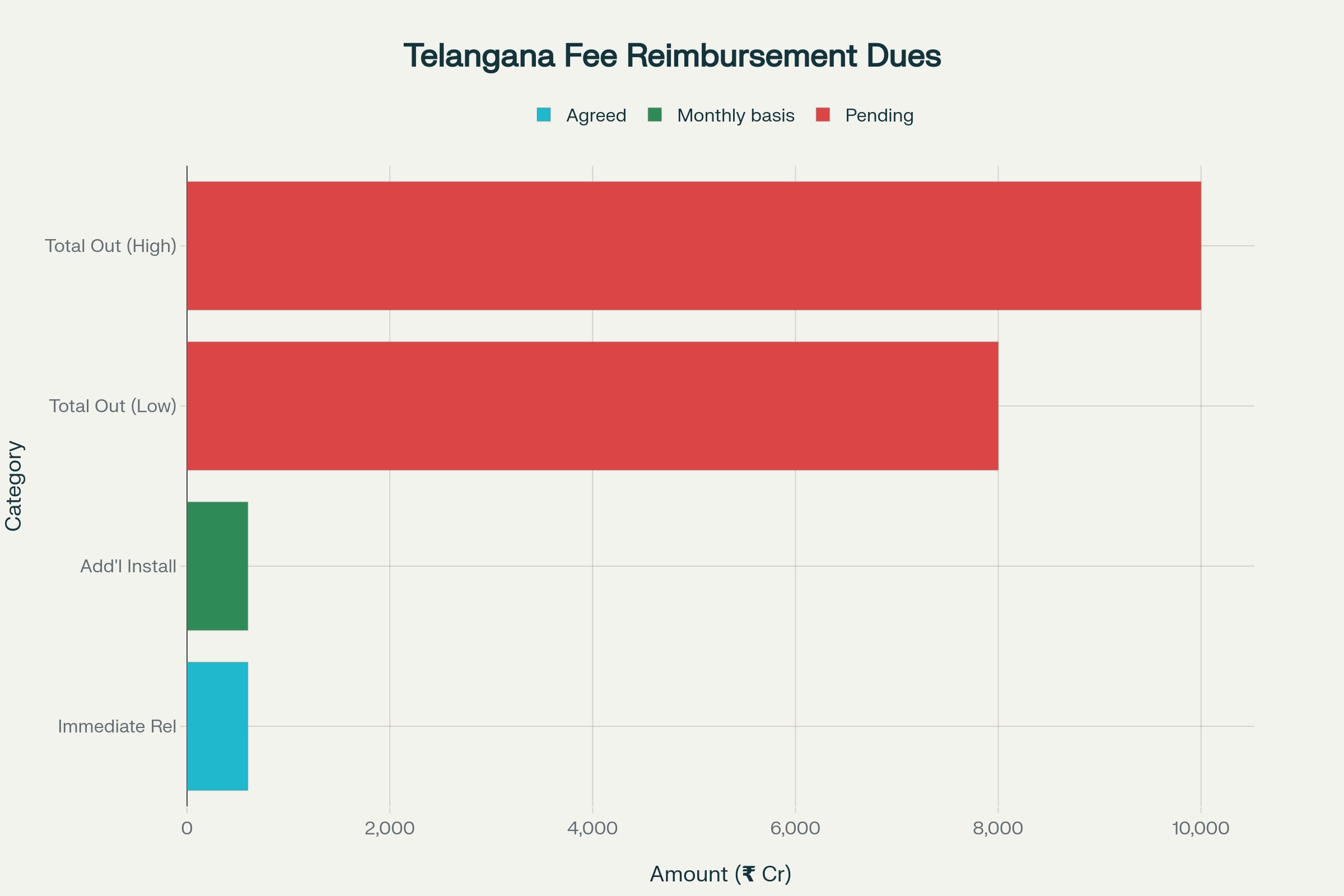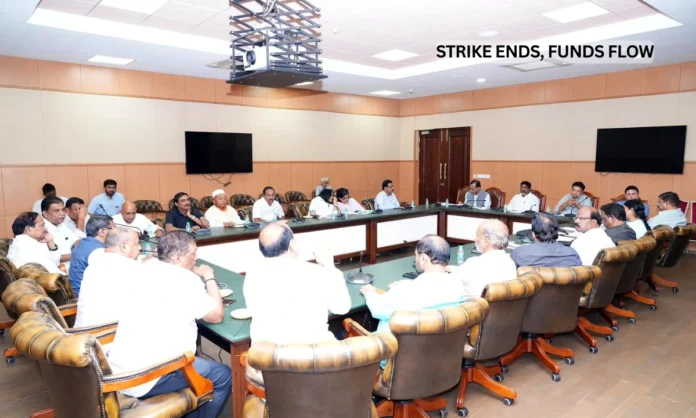Key Highlights:
- Private colleges across Telangana called off indefinite strike after government assured immediate release of Rs 600 crore in pending fee reimbursement dues
- Deputy Chief Minister Mallu Bhatti Vikramarka announced additional Rs 600 crore to be released in monthly instalments without specific timeline
- Over 2,000 private professional and degree colleges had shut down affecting approximately 14 lakh students since September 15, 2025
Opening Overview
The Telangana college strike crisis reached resolution as thousands of private professional colleges across the state reopened following successful negotiations with the government regarding long-pending fee reimbursement dues. The Federation of Associations of Telangana Higher Institutions (FATHI) called off their indefinite strike after Deputy Chief Minister and Finance Minister Mallu Bhatti Vikramarka announced the immediate release of Rs 600 crore toward clearing accumulated fee reimbursement arrears.
The Telangana Government will immediately clear ₹600 Cr fee reimbursement dues for which tokens were issued, and the remaining will be settled in a phased manner.
— Bhatti Vikramarka Mallu (@Bhatti_Mallu) September 15, 2025
With this assurance, private college managements have decided to call off their indefinite strike. pic.twitter.com/xjNOa9iEWP
This development brings relief to over 14 lakh students whose academic activities were disrupted when more than 2,000 private colleges shut down on September 15, demanding clearance of dues estimated between Rs 8,000 to Rs 10,000 crore. The Telangana college strike resolution demonstrates the state government’s commitment to addressing educational funding challenges while ensuring continuity of higher education services across the region.
Financial Crisis Behind Telangana College Strike
- Private colleges faced severe liquidity crunch with faculty salaries pending for months due to delayed government payments
- Accumulated dues under fee reimbursement scheme created operational difficulties for educational institutions statewide
The Telangana college strike emerged from a deepening financial crisis affecting private educational institutions dependent on government fee reimbursements. According to official estimates from the Telangana budget analysis, the state allocated only 8.6% of its total expenditure toward education in 2024-25, significantly lower than the national average of 14.7%. Private colleges in Telangana had been grappling with mounting debts as the government’s fee reimbursement payments, which constitute 40-60% of institutional revenue for many colleges, remained delayed by 3-4 years without assurance of timely disbursal.
The Federation of Associations of Telangana Higher Institutions highlighted that over Rs 5,000 crore had accumulated during the previous BRS government’s tenure, with an additional Rs 3,000 crore added under the current Congress administration. Educational institutions reported being unable to pay staff salaries for months, creating operational instability across the sector. The crisis particularly affected engineering, pharmacy, MBA, and law colleges offering courses under the government’s fee reimbursement scheme for students from economically weaker sections.
With private college enrollment in Telangana reaching 892,333 students as of 2021-22 and caste-based reservations constituting 50-60% of total student intake, institutions heavily depended on government scholarships for operational sustainability. The Telangana college strike thus represented a systematic challenge to the state’s higher education financing model rather than isolated institutional demands.

Telangana Fee Reimbursement Dues Breakdown 2024-25
Government Response to Telangana College Strike
- Deputy Chief Minister Vikramarka led extensive discussions with college managements over the weekend to resolve the crisis
- Formation of committee announced to streamline future fee reimbursement processes and prevent similar situations
The Telangana college strike resolution came through intensive negotiations led by Deputy Chief Minister Mallu Bhatti Vikramarka, who acknowledged the inherited financial burden from the previous administration. During extensive talks with college representatives, the government agreed to release Rs 600 crore immediately, with equitable distribution among all colleges for which tokens had already been generated to prevent monopolization by select institutions. The minister emphasized that despite the state’s fiscal challenges, education remained a priority, particularly for middle-class and underprivileged families dependent on fee reimbursement schemes.
Vikramarka announced the formation of a committee comprising higher officials and college managements within 2-3 days to rationalize fee structures and streamline the reimbursement process. Chief Secretary K Ramakrishna Rao received orders to implement systematic reforms making future payments more transparent and efficient. The government also pledged that remaining dues would be disbursed on a monthly basis, though no specific timeline was provided for complete clearance.
College managements welcomed the decision, with FATHI chairman N Ramesh Babu calling the payment promise a “good sign” and confirming the strike’s suspension. The agreement marked a significant compromise, as colleges had initially demanded Rs 1,200 crore but accepted the partial payment coupled with systemic reform commitments. Reports indicated the government also invoked vigilance and enforcement reports on irregularities in several colleges, using potential closure threats to encourage management compliance.
Impact on Students and Educational Continuity
- Academic activities for approximately 14 lakh students resumed immediately following strike resolution
- Professional courses including engineering, pharmacy, MBA, and law were among the most affected programs
The Telangana college strike significantly disrupted educational continuity for over 14 lakh students enrolled in private professional and degree colleges across the state. Students pursuing engineering, pharmacy, MBA, MCA, B.Ed, nursing, and law courses faced immediate academic uncertainty when institutions shut down indefinitely on September 15, 2025. The timing proved particularly challenging as the strike occurred during the academic year, potentially affecting semester schedules, examinations, and placement activities.
Educational stakeholders expressed relief at the swift resolution, emphasizing the importance of uninterrupted academic progress for students from underprivileged sections who benefit from fee reimbursement schemes. The strike’s end ensured that the 2025-26 academic year could continue without further disruption, protecting students’ educational investment and career prospects. Student organizations across districts had staged protests during the strike period, highlighting the urgency of resolving the funding crisis.
With Telangana’s Gross Enrollment Ratio in higher education standing at 35.7% compared to the national average of 25.8%, maintaining educational access through private institutions remains crucial for the state’s development goals. The resolution preserved educational opportunities for students dependent on government support while ensuring institutional sustainability for continued service delivery. The Telangana college strike resolution thus protected both immediate student interests and long-term educational infrastructure stability.

Telangana Education Sector Key Statistics
Systemic Telangana College Reforms and Future Path
- Committee formation aims to prevent recurrence of similar financial crises through improved processes
- Monthly installment system proposed to ensure regular payment cycles for educational institutions
The Telangana college strike resolution introduced systematic reforms designed to address underlying structural issues in the state’s educational financing mechanism. The newly announced committee will focus on rationalizing fee structures while establishing transparent, regular payment schedules to prevent accumulation of arrears. This represents a shift from ad-hoc crisis management toward institutionalized processes ensuring sustainable funding for private educational institutions.
Deputy Chief Minister Vikramarka’s commitment to monthly installment payments signals recognition that irregular disbursements create operational instability across the education sector. The government’s acknowledgment of inherited debt from the previous administration, while taking responsibility for current obligations, establishes accountability for future payment schedules. These reforms align with broader fiscal management improvements as Telangana works to balance educational commitments with overall budget constraints.
The resolution establishes a precedent for collaborative problem-solving between government and private educational institutions, potentially preventing future disruptions to student welfare. With private colleges contributing significantly to Telangana’s higher education capacity, maintaining their financial viability supports the state’s educational objectives and economic development goals. The Telangana college strike resolution thus creates a framework for sustainable educational funding that protects both institutional operations and student access to quality higher education.
Looking ahead, the success of these reforms will depend on consistent implementation of monthly payment schedules and effective committee oversight of the fee reimbursement system. The government’s ability to honor its commitments will determine whether this resolution provides lasting stability or merely temporary relief for Telangana’s private education sector.
Telangana College Strike Assessment
The Telangana college strike resolution demonstrates effective crisis management through collaborative dialogue between educational institutions and government authorities, ensuring minimal disruption to student welfare while addressing systemic funding challenges. The immediate release of Rs 600 crore, combined with commitments for regular future payments and structural reforms, provides both short-term relief and long-term stability prospects for the state’s private education sector. This outcome preserves educational access for over 14 lakh students while establishing frameworks to prevent similar crises, reflecting the government’s recognition that sustainable educational funding remains essential for Telangana’s continued development and student welfare.


